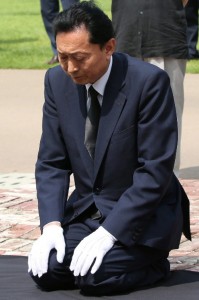- California Assembly OKs highest minimum wage in nation
- S. Korea unveils first graphic cigarette warnings
- US joins with South Korea, Japan in bid to deter North Korea
- LPGA golfer Chun In-gee finally back in action
- S. Korea won’t be top seed in final World Cup qualification round
- US men’s soccer misses 2nd straight Olympics
- US back on track in qualifying with 4-0 win over Guatemala
- High-intensity workout injuries spawn cottage industry
- CDC expands range of Zika mosquitoes into parts of Northeast
- Who knew? ‘The Walking Dead’ is helping families connect
Ex-Japanese PM visits Seoul, kneels at memorial monument

Former Japanese Prime Minister Yukio Hatoyama kneels before a memorial monument for Korean independence fighters tortured to death during the 1910-45 Japanese colonial rule, during his visit to the site of a colonial-era prison in Seoul, Wednesday. ( Yonhap)
By Yi Whan-woo
A former Japanese prime minister apologized at the site of a colonial-era prison Wednesday where numerous Korean independence fighters were tortured and killed.
The visit by Yukio Hatoyama, the predecessor of Prime Minister Shinzo Abe, to the Seodaemun Prison History Hall in Seoul is timely given Abe’s planned statement this week to mark the end of World War II.
At one point, Hatoyama ― who led the Japanese government from September 2009 to June 2010 ― knelt down and paid his respect to those who were killed at the prison by Japanese police during the Japanese colonial rule (1910-45).
He is on a trip to Korea to attend the International Conference for Peace in East Asia which will kick off in Seoul Thursday for a two-day run. The forum will take place on the occasion of the 70th anniversary of Korea’s liberation from colonial occupation on Aug. 15, 1945.
Hatoyama, who is known for his dovish stance on relations with East Asian neighbors, urged Abe to make a sincere apology over Japan’s invasion of Korea.
Speculation is rampant that the nationalist Abe will water down the landmark apology offered by then-Prime Minister Tomiichi Murayama in 1995 over Japan’s state-sponsored crimes during the colonial period.
It is expected that Abe will instead highlight the bright side of postwar Japan in his statement expected to be released on Friday, raising concerns over the future of the already-frayed Seoul-Tokyo ties.
“Through its colonial rule and aggression, Japan caused tremendous damage and suffering to the people of many countries, particularly to Asian nations,” he said. “The Abe statement must carry remorse and repentance to Korea and China.”
Hatoyama also apologized to Korean journalists present regarding Japan’s systematic beating and torture of Korean patriots at Seodaemun prison.
He highlighted victims included Ryu Gwan-sun, a female activist who was a key organizer in what would come to be known as the March 1st Movement in 1919 against Japan. She died at age of 18 while she was in jail.
“In the hope that no such mistake is made in the future, I regard, in a spirit of humility, these irrefutable facts of history, and express here once again my feelings of deep remorse and state my heartfelt apology.”















